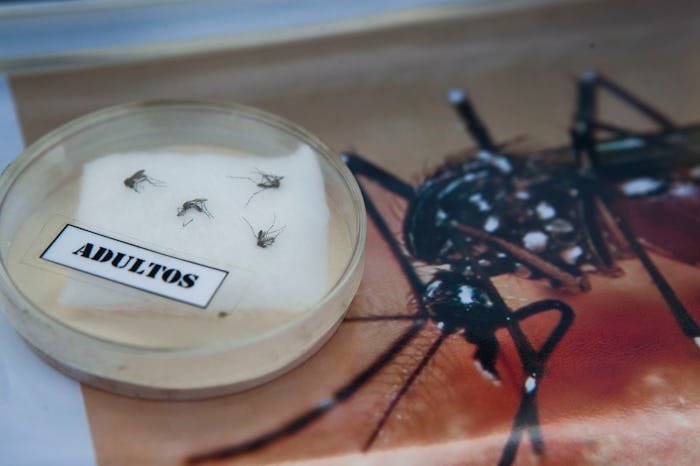Life

Can Zika Live In Sperm? The Unprotected Sex Should Wait
By now, most moms are probably aware that contracting the Zika virus while pregnant can result in devastating birth defects, like brain damage and developmental problems, once the baby is born. Since the outbreak of the mosquito-borne illness erupted in Brazil last year, officials in some infected countries have warned women against getting pregnant. But as hundreds of Americans are reporting travel-associated Zika cases — and some of those were sexually transmitted — they're wondering whether Zika can live in sperm, for how long, and what the heck this means for family planning.
Zika is rampant in South and Central America, the Caribbean, the Pacific Islands, Mexico, Cape Verde and elsewhere, too, and most of the cases are the result of a bite from a type of mosquito called Aedes aegypti. If a man contracts the virus this way, it's generally no big deal for his own health, as Zika symptoms in kids and adults are usually relatively mild. If he's having sex with a woman who's pregnant or who may become pregnant, though, the threat level climbs. That's because the Zika virus can migrate from his bloodstream to his semen, and health officials aren't sure how long it can stay there.
NBC News reported that the World Health Organization and the Centers for Disease Control and Prevention urge couples to wait at least eight weeks before having unprotected sex if either partner has traveled to Zika-infected areas, in order to avoid pregnancy. That's regardless of whether or not either a man or woman shows symptoms, because it's possible to have contracted the virus and not know it.
Although some women are concerned that they should never get pregnant if they have had the Zika virus, that's not the case. If the male partner has exhibited Zika symptoms (like fever, rash, and muscle pain) after traveling to a country dealing with an outbreak, the good people at WHO believe it's a smart idea to wait six months before a couple tries for a pregnancy.
And if she's already pregnant? Either use a condom or just don't have sex until she's had the baby, because if the mother gets the virus, the fetus can end up with the horrible effects. There's no vaccine, treatment, or cure for Zika yet (although one could be on the horizon), so this is serious.
So when it comes to Zika and family planning, men need to be just as vigilant and proactive as women. Zika in a pregnant woman's body can affect her unborn baby, but only through her bloodstream. And CNN reported that Zika lingers in the bloodstream for only about 5 to 10 days. It could have a longer shelf life in semen.
According to the CDC, of the 820 Zika cases in the United States reported as of June 22, 819 are travel-related (the one exception was contracted in a lab, so it's not of real concern to the public). But 11 were sexually transmitted, so while mosquito transmissions tend to dominate the news, travelers, and those getting intimate with them, should pay attention to the risks, and take the appropriate steps to mitigate them.